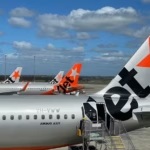Rishi Sunak, the British Chancellor of the Exchequer (the Finance Minister) has said that there would be no blanket rescue package for UK airlines as a result of the catastrophic decline in passenger numbers.
The statement follows meetings early last week when airlines made appeals for £7.5 billion immediately from the government.

The Chancellor has said that the government would only step in as a last resort after all other avenues had been exhausted, including loans from commercial banks and from new or existing investors. He further added that any support would be bespoke—meaning that terms and conditions would be specific to the carrier.
By their own actions, three of the UK’s major airlines have done themselves no favours if they intend to appeal to the Chancellor. Just a few weeks ago British Airways protested on principle against a government bailout of the now-defunct Flybe; it’s quite difficult now to argue that they deserve a helping hand: they’ve also said that they have plenty of cash. Virgin Atlantic’s parent company is registered in the tax-haven of the British Virgin Islands, so isn’t likely to solicit much sympathy from the British government. Sir Richard Branson has recently been criticised for not doing more to help Virgin and apparently in response has committed a further $250 million. EasyJet has just distributed £171 million in dividends to its shareholders and handed over £60 million to its founder Sir Haji-Ioannou, so it can hardly claim the wolf is at the door either.
As always with limited means and unlimited wants, any investment by the UK government will need to answer three questions, if it must hand over significant amounts of cash;
- To which airline will it lend? We have to assume there needs to be a viable, pre-existing business model. Which would nearly bring us back to the old adage about credit; those who can get it probably don’t need it.
- How—and when—would it withdraw the funds—the ‘exit strategy’. When business is ‘back to normal’? And when is that? Will the commercial aviation business revert to the status quo of 2019?
- Are there better and more deserving causes? With the demise of Flybe, a number of the smaller regional airports in the UK; Exeter, Cardiff, Southend and others are in dire straits. Perhaps they are more deserving. And what about the railways–also in deep trouble? What is the principle here, the greatest good for the greatest number?
Chancellor Sunak faces many difficult decisions and can promise little more than to treat each case on its merits. We await the outcome with interest and will report as details are made available.









